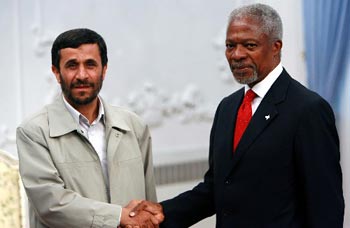
Iranian President Mahmoud Ahmadinejad (L) shakes hands
with UN Secretary General Kofi Annan during their meeting in Tehran Sept. 3,
2006. -Xinhua
United Nations Secretary-General Kofi Annan on Sunday wrapped up his two-day
visit to Iran without achieving any breakthrough on its nuclear issue as Tehran
insisted that suspension of uranium enrichment would not happen before talks.
In a meeting with the UN chief Sunday morning, Iranian President Mahmoud
Ahmadinejad reaffirmed to Annan Iran's preparedness and commitment to hold
negotiations.
But Ahmadinejad reiterated that Iran would not accept suspension of uranium
enrichment before negotiations, Annan told a joint press conference with Iranian
Foreign Minister Manouchehr Mottaki.
The UN chief said he had a better understanding of Iran's stance on the
nuclear issue and would discuss it with key members of the Security Council.
Annan said he hoped all parties concerned would find a way to move forward at
a planned meeting between EU foreign policy chief Javier Solana and Iran's top
nuclear negotiator Ali Larijani this week.
For his part, Mottaki said Iran's stance on its nuclear program was
transparent enough and Annan had gotten familiar with it.
The Iranian foreign minister said now it was the turn of world powers to
consider Iran's response to their package aimed at resolving the nuclear issue.
"If there is a need for any time for their consideration, we can provide them
with it," Mottaki said.
Mottaki also said that UN Security Council Resolution 1696 was a "mistake"
made under the pressure of the United States and its allies, and hence "a black
mark registered in their records."Iranian Foreign Ministry spokesman Hamid-Reza
Asefi said earlier in the day that Iran hoped to reach a consensus over its
nuclear issue after the meeting between Larijani and Solana.
"The situation would be more clear after the meeting and we hope to reach a
consensus," Asefi told a press briefing.
Solana is expected to hold talks with Larijani this week to clarify
ambiguities in Iran's response to an incentive package offered by the United
States, Russia, China, France, Britain and Germany.
Asefi said the exact date and place of the meeting were yet to be decided but
it will be "within the next few days."
The package includes both incentives aimed at persuading Iran to suspend
uranium enrichment and possible sanctions if Iran does not comply.
Larijani delivered Tehran's written response to the package on Aug. 22 and
urged the six nations to get back to negotiations, saying Iran was ready to
start "serious talks" over its nuclear program.
The UN Security Council adopted Resolution 1696 in late July, urging Tehran
to suspend by Aug. 31 all enrichment-related and reprocessing activities,
including research and development, or face prospect of sanctions.
On Aug. 31, International Atomic Energy Agency chief Mohammed ElBaradei
presented a report to the Security Council, saying "Iran has continued enriching
uranium despite a UN nuclear deadline for it to suspend or face possible
sanctions."
As the United States was seeking to press for sanctions on Iran after it
refused to stop enriching uranium, the European Union, however, agreed on
Saturday to give Iran extra time, probably two weeks, to clarify ambiguities in
its response to the six-nation package.
Meanwhile, Ali Asghar Soltanieh, Iran's representative to International
Atomic Energy Agency (IAEA), warned Saturday that Iran would revise its policy
of cooperating with the IAEA if sanctions are imposed over its nuclear program.
"If other erroneous measures are committed and the UN Security Council
decides on sanctions or punitive measures, there is no doubt that the Islamic
Republic of Iran will revise its policy of cooperation and its engagements laid
out in the nuclear Non-Proliferation Treaty (NPT)," he noted.
The warning was echoed by Iranian lawmakers as the parliament's National
Security and Foreign Policy Commission discussed on Sunday a draft bill on
possible suspension of visits by IAEA inspectors to Iran's nuclear facilities.
The Iranian members of parliament have repeatedly warned that Iran would
withdraw from the IAEA if its "inalienable rights" are deprived of.



